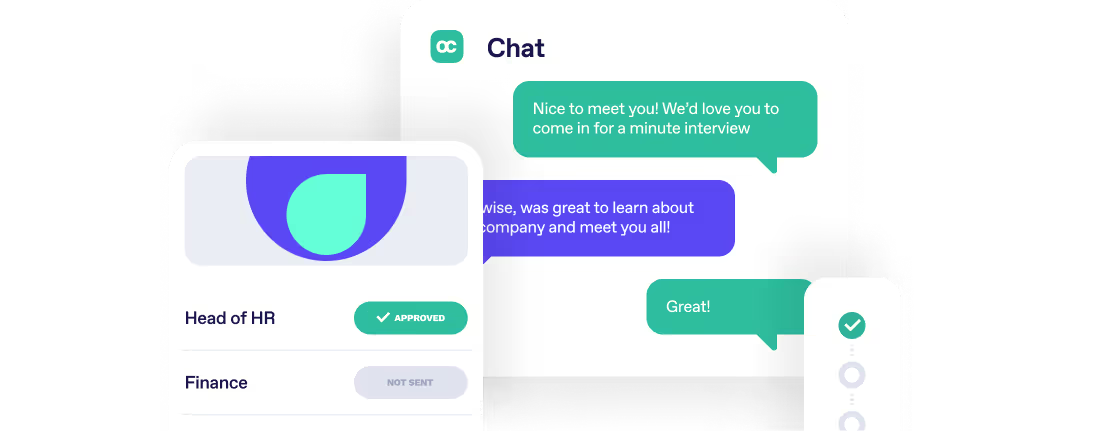How to Create a Recruitment Marketing Strategy Without Being a Marketer



Companies who excel at recruitment marketing strategies can have up to 152% higher average revenue per year than those who under-perform, according to SmashFly’s Recruitment Marketing Benchmarks Report.
Creating and implementing a sucessful recruitment marketing strategy, in addition to all of the other many tasks a HR team must perform on a daily basis, can prove difficult to manage. So to help you to keep on top of the competition, we’ve compiled these top tips to help you create a winning recruitment strategy – without being a marketer.

What is recruitment marketing?
Recruitment marketing is a relatively new way to attract candidates, both passive and active, to your company. It involves adopting the same principals and strategies used by marketing to attract customers and increase brand awareness. For examples are marketing practises that are now being utilised by HR teams include: lead generation, SEO, guerrilla marketing, social advertising, personalised candidate journey and content creation.
According to SHRM, companies that incorporate recruitment marketing into their hiring strategy can generate three times more applicant leads than those who don’t — leading a 100% higher close rate on applicants. Additionally, recent research by Allegis found that running a recruitment marketing campaign can save companies up to 40% on total talent costs. On top of these savings, recruitment marketing boosts employer brand and attracts an estimated 50% more qualified candidates.
How to create a recruitment marketing strategy
1. Know your candidate
A successful recruitment marketing strategy depends on having an in-depth knowledge of your potential candidate. As we mentioned above, job seekers in general are beginning to behave more like consumers. This is a fact that must be acknowledged by your recruiting team.
As well as this, you should have a clear idea of your candidate persona. This is a semi-fictional representation of your ideal candidate or hire, based on data from previous hires and current employees. In order to effectively market to your ideal candidate you need to know specific details about them, such as their age range, where are they active - on or offline, skill set and personality traits.
If your candidate persona reflects someone on the younger side, for example, it wouldn’t make much sense to advertise your position in a newspaper, considering a study by the Aberdeen Group discovered that 73% of millennials found their last position through a social media platform. Knowing your candidate persona also makes it easier to create engaging inbound marketing content to attract the right candidates, something we will discuss further below.
2. Know your company
Another essential area for effective recruitment marketing is a well defined – and publicised – employee value proposition. Employer Brand Strategist Brett Minchington defines an Employee Value Proposition (or EVP) as a set of associations and offerings provided by an organisation in return for the skills, capabilities and experiences an employee brings to the table.
Your EVP should be no longer than one or two sentences, explain who you are and what you do as a company, and most importantly, should be a unique and compelling read. In addition to clearly defining your EVP, you must also make sure to successfully promote it. This can be done in a number of ways, including employee testimonials, company and team blogs or company videos.
Having a clear and attractive EVP also helps to improve your overall employer brand, which 83% of talent acquisition leaders say significantly impacts their ability to hire great candidates, according to LinkedIn’s Employer Branding Playbook.
INSERT-CTA
3. Get familiar with inbound
Traditional recruitment methods typically rely more on outbound marketing techniques such as posting a job description or working with a third-party recruiter. While recruitment marketing does involve these types of methods, inbound marketing is becoming increasingly important to maintaining a great recruitment marketing strategy.
Inbound marketing involves actively attracting and building relationships with candidates through creation of interesting, informative and entertaining content in a language that your ideal candidates will relate and respond positively to. Create videos and blog posts featuring current employees that showcase what it’s like to work at your company. We suggest adding some budget to this collateral, pushing it out on platforms where your audience is active i.e. YouTube or Facebook. This will serve to attract candidates, improve your employer brand and bring people to your careers site.
Inbound recruitment marketing, when done correctly, will also help to improve your candidate experience, a vitally important part of the recruitment process. A recent Candidate Experience Research report found that 46% of candidates would sever a business relationship due to a poor candidate experience, while 74% of candidates who rate their experience as “great” say they’ll definitely increase their employer relationships by applying again, referring others and making purchases when applicable.

4. Build a social media presence
One of the simplest to adopt but most effective components of a successful recruitment marketing strategy is to have an engaging and impossible to ignore presence on social media. You can do this not only by making sure your brand stays active on platforms such as Instagram, but also by getting involved with industry discussions and conversations online.
A recent survey by Glassdoor found that 79% of job applicants use social media in their job search. This is a statistic that you should use to your advantage, and to do so it is imperative that you have a social media presence which people are drawn to and impressed by.
Engage with your potential candidates by asking questions and creating informative and interesting content such as blogs, videos and photographs. The more you build up your network, the more people will be talking and thinking about your brand, and any open positions you may have.
So those are our top tips for tackling recruitment marketing – without being a marketer: get to know your candidate persona, establish and promote your employer brand, utilise inbound marketing strategies and make the most of social media. Hopefully these quick and easy points will help save some time when creating your next recruitment marketing strategy.
INSERT-LINE
One more easy way to create a recruitment strategy without being a marketer, is to choose the right software to enable you to do so. Carefully chosen software can also help save you time and money. You can track the effectiveness of different campaigns on generating pipeline, which will help you prioritise the best investment of your time and resources.
Occupop is a recruitment software that uses A.I. technology to help you achieve the quickest and easiest hiring process. We can help you screen applicants, sort CVs and even schedule interviews, all on one centralised platform. This will ensure that your candidates have the best experience possible--and that they go on to appreciate and promote your employer brand.
Visit www.occupop.com to get started for free today, and subscribe to our blog below to get all of our recruitment tips and tricks sent straight to your inbox!
Summary Points
Recruitment Marketing is the process of attracting talent to your organisation through marketing. As candidates are increasingly behaving like consumers when they look for jobs, recruiters must change their strategies to reflect this change. Here's our tips on creating a recruitment marketing strategy without being a marketer:
- Know your candidates: A successful recruitment marketing strategy depends on having an in-depth knowledge of your potential candidate. As well as this, you should have a clear idea of your candidate persona. This is a semi-fictional representation of your ideal candidate or hire, based on data from previous hires and current employees.
- Know your company: Another essential area for effective recruitment marketing is a well defined – and publicised – employee value proposition (EVP). An EVP is a set of associations and offerings provided by an organisation in return for the skills, capabilities and experiences an employee brings to the table.
- Get familiar with inbound: Inbound marketing involves actively attracting and building relationships with candidates through creation of interesting, informative and entertaining content in a language that your ideal candidates will relate and respond positively to.
- Build a social media presence: Engage with your potential candidates by asking questions and creating informative and interesting content such as blogs, videos and photographs. The more you build up your network, the more people will be talking and thinking about your brand, and any open positions you may have.
Simple. Beautiful.
Recruitment Software.
HR updates sent straight to your inbox
You might also like...


Manage your entire hiring process simply, from engagement to management, hiring and onboarding







Simple. Beautiful.
Recruitment Software.
Recruitment Software.






